

Discover more from Fast Women
Fast Women: Tessa Barrett's journey from high school star to marathon champion
The running world migrates to Bluesky.
Issue 324, sponsored by Topo Athletic
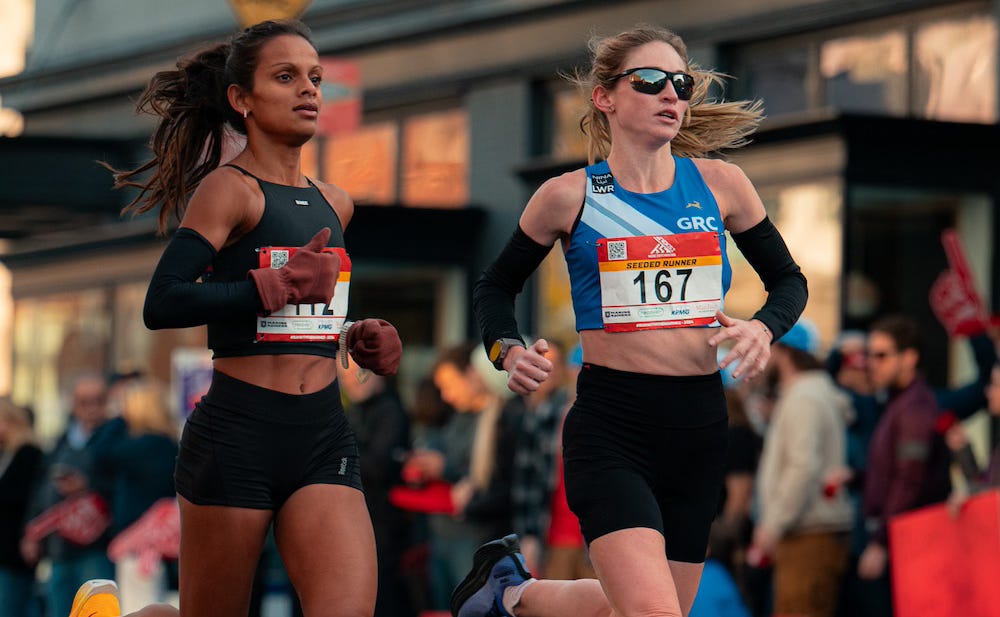
Balance is key in Tessa Barrett’s return to competitive running
Each year, the Foot Locker Cross Country Championships bring together 40 of the best high school runners in the country to compete for a national title in San Diego, California. If you scroll through past results of the event, you’ll recognize the names of athletes who went on to become Olympians or professional runners. But for every one of those, there are far more who have taken other paths in life.
Tessa Barrett competed at the Foot Locker Cross Country Championships only once, as a senior, in the fall of 2013, but that was all it took for her to become a national champion. She won two more national titles in indoor track before moving on to Penn State. Barrett’s story is still a work in progress, but it’s one of struggle, loss, resilience, community, hard work, and falling back in love with running again. And the most recent chapter included a win at the Marine Corps Marathon on October 27, with a personal best of 2:39:38.
A big win at home
Barrett, 28, says she doesn’t travel well, so she prefers to race close to home whenever possible. And no race is more convenient than the Marine Corps Marathon, which finishes about a half mile from her apartment in Arlington, Virginia. She jogged to the start of the race. The initial plan was to start out around 6:10/mile and pick up the pace, but early in the race she found herself running alongside 2:34 marathoner Hiruni Wijayaratne, going a little quicker than planned. Barrett was feeling good and enjoying the company.
Around Hains Point, just before halfway, Barrett took the lead for good. Because that part of the course is on a peninsula, there weren’t many spectators, but Barrett is used to that. She runs that stretch of road in training every week. “I'm used to having it be quiet and just kind of getting into like my tempo zone and just going,” she said in a phone call with Fast Women.
Elsewhere on the course, Barrett had a lot of support. She’s lived in the D.C. area for six years and trains with a variety of local running groups, so she’s recognizable, and she also had family and non-running friends cheering her on. She ultimately won the race by more than six minutes (Wijayaratne dropped out after 35K) and took six minutes, 15 seconds off of her personal best.
Marine Corps was Barrett’s fourth marathon and her best so far. In her debut at the 2022 Chicago Marathon, she ran a solid 2:45:53 off of only about seven weeks of marathon-specific training. Her next two marathons were slower due to illness or nutrition struggles.
It was fitting that the victory came in the city that helped Barrett rediscover her love of running. “Never in a million years did I think that I would be able to run at a high level while working full time and having a life—like social life, friends, family—and even be competitive, let alone be winning races,” she said. “It's really just been a dream year of running. I have just an amazing group around me, and to be able to share that with them was just a really exceptional moment.”
Success amidst struggle
As a ninth grader at Scranton (PA) Prep, Barrett began dealing with what would eventually be diagnosed as atypical migraine syndrome. She would develop migraines so severe that they would often lead to seizures. One of the biggest triggers was exposure to fluorescent lights, which are difficult to avoid.
Midway through her sophomore year, the seizures forced Barrett to leave the high school she loved and enroll in online school. She was still able to run for a local high school, which became her social outlet, but it wasn’t easy being “the sick kid,” she said. “I think running kind of kept me sane, and it was the one thing in life that I could somewhat control.”
It took a while for Barrett to find the right medication, but that ultimately helped, as did maintaining a high level of physical activity. During her junior and senior years, when she finally wasn’t sick every day, Barrett’s running began to improve. But it was a stressful time. Her father was ill, and she was trying to get good grades and figure out her college plans.
Barrett came up with a lot of her own training during high school. She ran about 40 miles per week, but also spent a lot of time swimming, pool running, and strength training. “Every run, I was just hammering, which was probably not the best,” she said. “But I wouldn’t have listened to anybody if they had told me different. I didn’t know about stretching, taking days off, or the female athlete triad.”
Shortly before Barrett graduated from high school, her father passed away. A week later, she found out that she had a sacral stress fracture. In her early college years at Penn State, she found herself in an injury cycle and she struggled with her mental health.
Barrett ultimately became a two-time All-American, with a high finish of fifth in the 5,000m at the 2017 NCAA Indoor Track & Field Championships and a personal best of 15:28.99 that season. “By the time I found my footing, it was just too late,” she said. “I did well, but I definitely never fully reached my potential.”
Finding balance
After graduating from Penn State in 2018, Barrett started a fifth year of eligibility at Providence College. She loved her time there but she didn’t finish out the year after her mother had an accident and Barrett moved home to help support her. In February, 2019, she moved to Washington, D.C. and began working for her current employer, Merrill Lynch. And shortly after, her mother, who grew up in the D.C. area, moved there as well.
Barrett decided she was done with high-level running, but she began running with the Georgetown Running Club (GRC) for fun, in an effort to make some friends. That was how she was connected with the team’s coach, Jerry Alexander, who helped give her running some purpose as she transitioned to post-collegiate running.
“I really just rediscovered my joy for the sport and at the same time, was able to build community through GRC,” she said. “And when it became fun again, that’s when I kind of felt more like myself. Running felt like such a job in college, but now it’s just a really fun hobby.”
The pandemic forced more solo running, but in 2021, when GRC began holding practices again, Barrett got into a routine of working out with the team every week, and she started to see results. From 2019 to 2021, she didn’t race at all, but in 2022, she began to dip her toe back in, including running a 1:14:37 at the Paris Half Marathon.
Even though Barrett works 60 hours per week as a financial adviser and runs up to 90 miles per week, she goes out of her way to make room for friendship and community as well. “College me would never have missed a double (run) or a weight lifting session,” she said. “Now I’m much more flexible with that kind of stuff, and mentally, it puts me in a good place.”
In order to fit her training in, Barrett sometimes gets up as early as 4:30 a.m. She does a disproportionate number of her weekly miles Friday through Sunday, because that’s what is most compatible with her work schedule. She also combines social time with training when she can. In addition to doing workouts with GRC, she takes part in various group runs. And being around less competitive runners has helped her appreciate the sport more.
“At the end of the day, it really doesn’t matter if you’re trying to run sub 2:40 or you’re trying to break 4:00 in the marathon, we’re all trying to improve ourselves, and there’s something really beautiful in that,” she said.
Looking ahead, while appreciating the present
When Barrett was in high school, doctors told her that as she got older, her atypical migraine syndrome would become less of an issue, and that proved to be the case. She has had a seizure since she was 18, and she’s almost off her medication now. “It’s something I’m always cautious of,” she said. “You’ll always see me in sunglasses when I run—sometimes people make fun of me for it—but I have terrible photosensitivity and I think I’ll probably have that my whole life.”
Barrett doesn’t have any concrete spring racing plans, but she’d like to run a 10,000m at some point, and improve upon her 34:22.03 personal best from college. She hasn’t raced on the track in more than six years. She’d also like to run a fast 10 miler. But she’s not putting too much pressure on any of it. “I'm just having fun with it, and I don't want to change that,” she said. “If it starts to feel like another job, then I'm out.”
Longer term, Barrett would love to qualify for the 2028 U.S. Olympic Marathon Trials. The qualifying time hasn’t been announced yet, but she’s excited to go after it, whatever it is. She made an attempt to qualify for the 2024 Trials by running under the half marathon standard of 1:12:00 at the 2023 Naples Half Marathon. She knew everything would have to go perfectly for her to have a shot, and it did not. She was running alongside Allie Kieffer, on pace, when they were both misdirected nearly a mile off course.
Whatever happens next, Barrett is grateful for where she is now. “I’ve had to face a lot of struggle and I’ve had a lot of loss, but I think the things I’ve gone through have made me appreciate life so much more,” she said. “And that includes the little things in life, like just being able to go out for a run, or meet friends for coffee. Knowing that life is very precious and none of us really knows how long we have has made my outlook so much greater.”
Thanks to Topo Athletic for supporting Fast Women this month
The Topo Specter 2 is the perfect shoe for runners who believe the journey toward their goals is as fulfilling as achieving them. Topo Athletic Athlete Holly Clarke says, “I’m absolutely LOVING the Specter 2s. I’ve been hitting long runs and tempo workouts in them, and they’re unbelievable.”
Topo encourages you to embrace the highs and lows, the sweat, and the smiles, because every mile brings you closer to greatness.
Elevate your journey, using the code FASTWTOPO for 15% off full-price items at topoathletic.com. Offer valid until 12/31/24.
If you’d like a chance to win a free pair of Topo shoes, we’re doing a giveaway on Instagram, and it’s open until tomorrow so that newsletter readers have a chance to enter.
The running world migrates to Bluesky
Twitter used to be my favorite social media platform, and it’s also where Fast Women had its biggest following. But it’s no secret that it hasn’t been the same since it changed ownership in 2022. Though I’ve continued to post on the platform since then, I’ve felt a lot less enthusiastic about it, and I haven’t put the same effort into it.
It also started to feel like a good chunk of the accounts that followed me didn’t have real people behind them. The 100 accounts without profile pictures that would follow me at once tipped me off. I tried removing them as followers for a while, but it was difficult to keep up. I’ve tried out Threads, which serves its own purpose, but it’s not a practical place for news or timely sports updates.
I’ve also had a Bluesky account for a while now, but any time I posted there, I felt like I was talking to myself. Until this past week. For a variety of reasons, people are now leaving Twitter en masse. And I am one of them. I decided last week that no matter how this all ultimately shakes out, by staying on Twitter, I was contributing to the problem. I’ve had a number of people tell me that the Fast Women account was one of the only reasons they remained on Twitter. And I didn’t want any part in that anymore.
It’s yet to be determined if Bluesky will become what Twitter once was, from a running perspective. But so far, it feels a lot more like the former Twitter than Twitter has in a long time. If you’re a member of the running media and you’re not already over there and posting, hurry up; you’re running late for the party. The athletes have been slower to follow, but I think that will be changing rapidly. Expect some growing pains, but I’m optimistic it will work out. (NY Times gift link)
Notable fast women who are already there and posting include Lauren Fleshman, Kara Goucher, Jess McClain, and Amelia Boone. And Dakotah Popehn, Tristin Colley, and Angie Rafter have set up accounts. With 1 million people currently signing up for Bluesky per day, I think that list will grow quickly. So consider joining us over there. (You can find Fast Women editor Sarah Lorge Butler here.) But I am also very much in support of anyone who decides their life is better off with one less social media account.
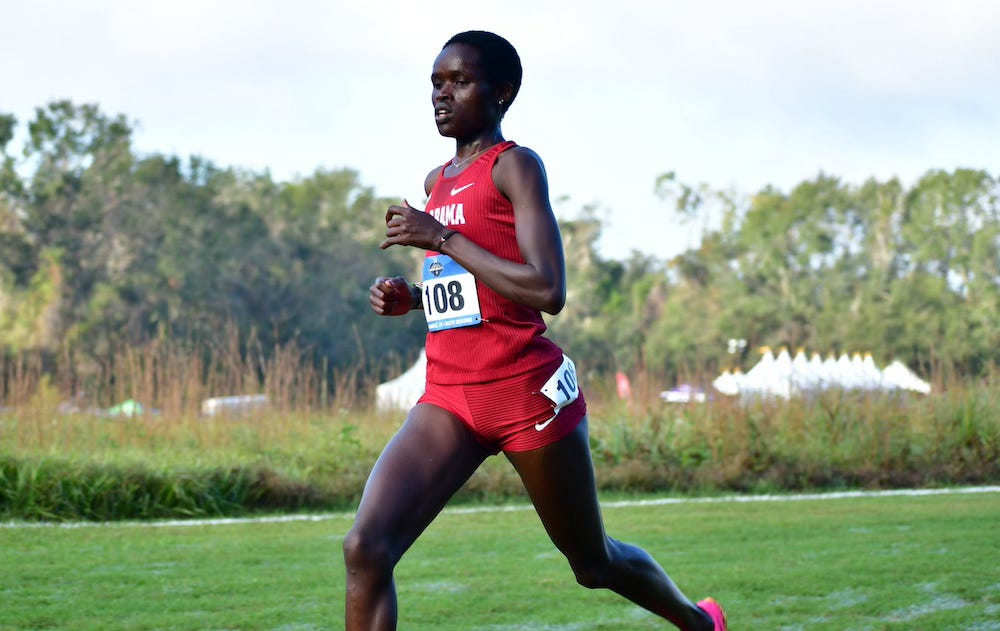
Regional races determine fields for NCAA DI Cross Country Championships
After Friday’s NCAA DI Cross Country Regionals, the fields are set for Saturday’s NCAA Cross Country Championships, which will be hosted by the University of Wisconsin. Most teams ranked in the top 30 made it to next week’s championship, only No. 22 Furman and No. 30 Utah Valley did not. Toledo, Texas, and Harvard were not ranked, but they ran well enough to earn their spots.
Clemson’s Silvia Jelego, Judy Kosgei, and Gladys Chepngetich went 2–4–7 at the Southeast Regional but they finished only sixth as a team, so they’ll just have three strong individuals at nationals. Amy Bunnage came in as a pinch hitter for Stanford, running her first race of the season and winning the West Regional. Hilda Olemomoi, now of Florida, barely held off her former teammate, Doris Lemngole of Alabama, to win the South Regional. And the individual favorite heading into NCAAs is probably New Mexico’s Pamela Kosgei, who won the Mountain Regional on a snowy course.
BYU won the Mountain Regional and goes into NCAAs as the top-ranked team, and No. 2 Oregon won the West Regional. It looks like Saturday’s championship will be on both ESPNU and ESPN+ starting at 9:30 a.m. ET. The women’s race starts at 10:20, and the men go at 11:10. You can get a little more information about all of Saturday’s NCAA Cross Country Championships here.
Other News and Links
Jacob Whitehead wrote an excellent but hard-to-read piece for The Athletic about gender-based violence in Kenya. It includes more details about Rebecca Cheptegei’s life and death than I’ve seen anywhere else, and I hope bringing more attention to the issue helps lead to change. In addition to Cheptegei, Damaris Muthee Mutua, Edith Muthoni, and Agnes Tirop were all athletes allegedly murdered by their partners. None of those men have faced any consequences. Meanwhile, the two men who murdered athlete Benjamin Kiplagat in Eldoret last December have each been sentenced to 35 years. The article looks at the ways female athletes in Kenya are exploited, and I appreciated that it mentioned that being pressured to take performance-enhancing drugs can also be part of that.
USATF CEO Max Siegel told The Associated Press that he hopes the 2028 U.S. Olympic Track & Field Trials will take place at the LA Coliseum, and he wants the meet to be shorter than the usual 10 days.
The four host cities for Grand Slam Track’s first season are set. The events will take place between April 4 and June 29 in Kingston, Jamaica; Miramar, Florida; Philadelphia; and Los Angeles. The league originally promised two international stops, but Jack Buckner of UK Athletics told The Guardian that they turned down the opportunity to be involved over financial concerns. “We’re positive about Michael Johnson’s format,” he said. “But three days of just track athletics is a lot of tickets to sell in the London Stadium and the cost base comes pretty high there.”
The grand opening of the University of Pennsylvania’s new indoor facility, the Jane and David Ott Center for Track and Field, took place on Saturday. The festivities included an exhibition mile for alumni, and Nia Akins ran what I’m told was an easy 4:49.95 for the win. The facility is scheduled to host 43 meets this indoor season, most of them for high school athletes.
Former professional runner Matt Elliott was arrested last week after being accused of having an inappropriate relationship with a female cross country runner at Charlotte (NC) Country Day, where he was a coach and substitute teacher.
Calling any fast women who plan to be near San Jose, California, on Thanksgiving. The Silicon Valley Turkey Trot will have an elite 5K field for the first time since 2019. More information and prize money details here.
I really appreciated Lindsay Gibbs’ Power Plays newsletter last week, titled “Transphobia is tearing us apart.” She pointed out that last month, The New York Times reported that Republican strategists found that anti-trans messaging was particularly effective in appealing to college-educated suburban women. The piece is definitely worth a read.
Additional Results
Olympic 5,000m and 10,000m champion Beatrice Chebet, of Kenya, won the Cross Internacional de Itálica in Seville on Sunday. (Recap)
Kenya’s Christine Chesiro won the Lille 10K in 29:56, and Nelvin Jepkemboi, also of Kenya, won the 5K in 14:48. (Results)
Ethiopia’s Mizan Alem dominated the Seven Hills Run 15K in the Netherlands, running 46:51 in her road racing debut. (Recap)
Ethiopia’s Yenenesh Shimket, 17, pulled off a surprise win at the Cinque Mulini—the race that goes through buildings—in Italy on Sunday. (Recap | Results)
Lauren Gregory capped off an excellent season with a win at the USATF 10K Trail Running Championships, hosted by Dirt Circus—Bentonville. Gregory, who attended college nearby at the University of Arkansas, won the race in 41:45, earning $3,000. Allie Ostrander finished second, and Marisa Howard, who was making her trail debut, was third. (Recap)
Kenya’s Sarah Naibei won the Flanigan’s Rockin’ Rib Run 10K in Miramar, Florida, running 31:23 and earning $8,000. Katie Camarena was the top American, running 32:46 for fifth, which earned her $1,000. (Results)
Great Britain’s Ellie Stevens won the Revel Big Bear Half Marathon, which has a net elevation drop of 3,162 feet, in 1:09:14. Stevens, 40, is an excellent runner on any course, but seeing a result like this makes me wonder what Ethiopia’s Letesenbet Gidey (who has run 1:02:52 on a record-legal course) and Kenya’s Agnes Ngetich (who has run 1:03:04) could run on a course like this. (Results)
Khia Kurtenbach, who was the 2017 NCAA DIII cross country champion for the University of Chicago, won the inaugural Every Woman’s Marathon, held in Savannah, Georgia, in 2:46:14. I saw a lot of posts that suggest this was a fantastic event, and I love that it caters to first-time marathoners. Not everyone was thrilled about the race, though. PETA protested at the start of the race, which was put on by MilkPEP, an organization designed to increase dairy milk awareness and consumption. (Results)
Normally I wouldn’t cover the Great World Race, which involves running seven marathons on seven continents in seven days, but this year’s race includes a number of fast women. Jenny Simpson, who just ran the New York City Marathon, said she was offered a spot in the race on November 9. She bought her plane ticket the following day and began the race on Thursday. Ashley Paulson won the first leg, in Antarctica, in 3:18:02. On day two, in Cape Town, Paulson, Hillary Kupish, Bes Gentry, Chirine Njeim, and Simpson finished holding hands, in 3:15:46. On day three, in Perth, they did the same, finishing together in 3:02:54, minus Simpson, who was fifth in 3:12:17. Simpson said there was a problem with the course in Istanbul on day four, so they had to run 1.055K out and back 20 times. Kupish had the fastest time of the day, running 3:05:44. She now narrowly leads Paulson in the overall race.
Podcast Highlights
In the latest episode of Women’s Running Stories, I appreciated how candid Emily Venters was about her mental health struggles in her first year as a professional runner. She said dialectical behavior therapy (DBT) has been a game-changer for her, and it was good to hear how much better she is doing now. She talked about her return to Utah and said she’s going to be pursuing a nursing degree while continuing to run professionally.
I also appreciated Courtney Olsen’s honesty on The Freetrail Podcast. Olsen just set a pending 50-mile world record at Tunnel Hill, and she talked about struggling with depression and not really understanding why she’s been able to continue to run well in spite of it. For more on Olsen’s record-setting run, Outside Run featured her, and she also did a Q&A with iRunFar.
It was good to hear from Athing Mu on The Jinger & Jeremy Podcast, because she has been relatively quiet since the Olympic Trials. She said that while she was distraught after falling at the Olympic Trials, going into the event injured helped soften the blow, because she had already entertained the idea that she might not make the Olympic team. She also discussed her engagement and looking forward to next year’s World Championships.
I enjoyed hearing from Sofia Camacho Ferral, who won the nonbinary division of this year’s New York City Marathon, on NYRR’s Set the Pace podcast. Camacho Ferral comes on at the 38:10 mark. They PRed by 10 minutes, running 2:31:29, despite having a relatively rough training block leading up to the race. They said they’re looking at potentially competing in the pro women’s field in the future. They started with wave one, which is a very different racing experience, but their time would have placed them 16th in the women’s field. And for much more about Camacho Ferral’s background and future hopes, they were also on The Lucie Beatrix Podcast. (Content warning: Discussion of sexual abuse and disordered eating.)
If you want to hear more from Emma Grace Hurley after last week’s Q&A, she was on the Ali on the Run Show last week.
I mostly listen to the Marathon Talk podcast to hear what Deena Kastor is up to and to hear her take on things. And I appreciated that within the first two minutes of this week’s episode, she made it clear how she felt about the outcome of the election.
I always appreciate hearing from fast woman and Ph.D. candidate Mel Lodge, who talked about the prevention and treatment of REDs, and her own experience with it, on The Lane 9 Podcast.
If you’ve made it this far, I want to thank so many of you for your kind responses to what I wrote about the election in last week’s newsletter. Thank you, also, to Topo for supporting Fast Women this month, and remember to enter our Instagram giveaway. Finally, a huge thank you to all of you who help keep this newsletter going with your support via Venmo and Patreon.
I hope you all have a good week.
Alison
Subscribe to Fast Women
The latest in women's competitive distance running.






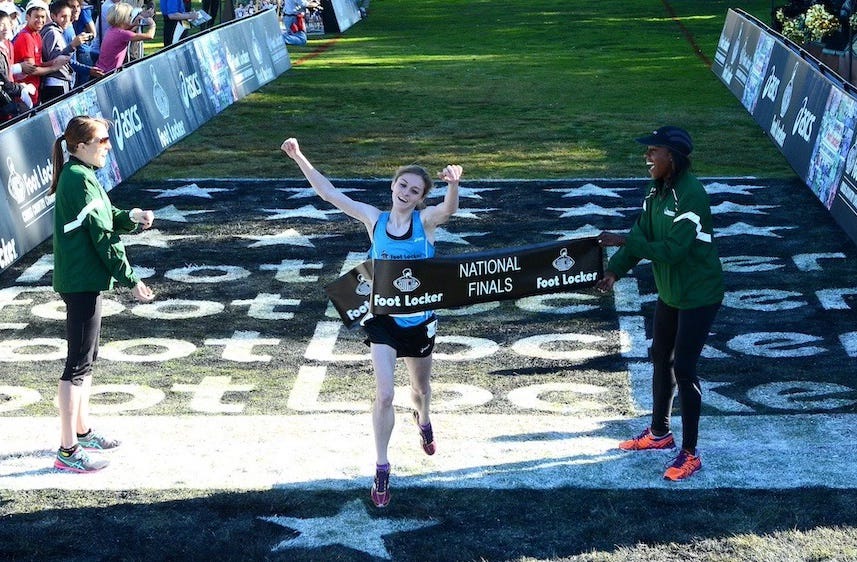
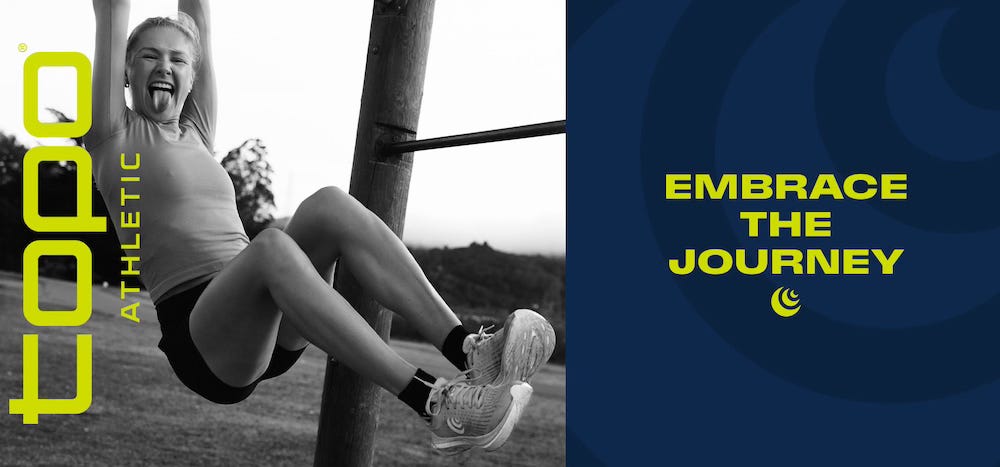
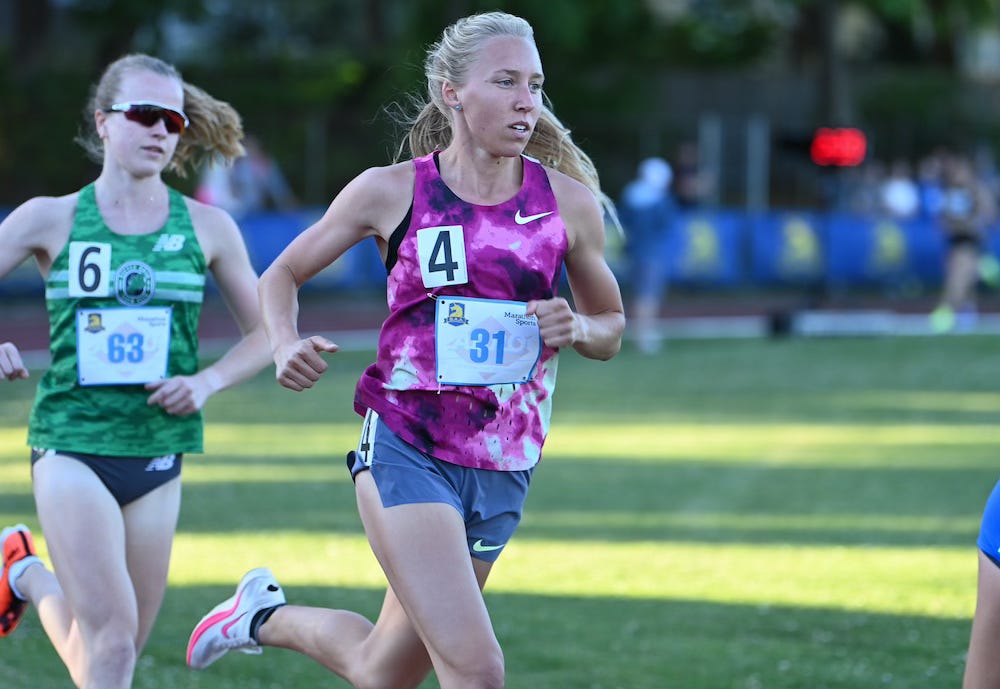





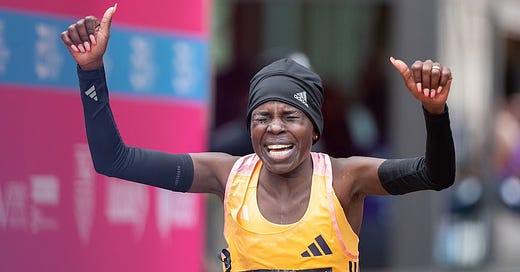

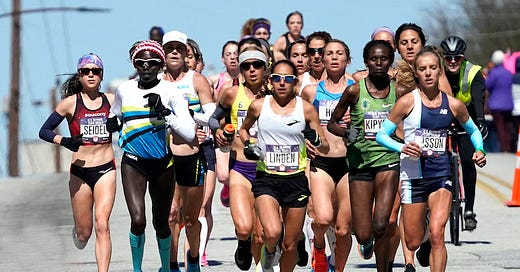

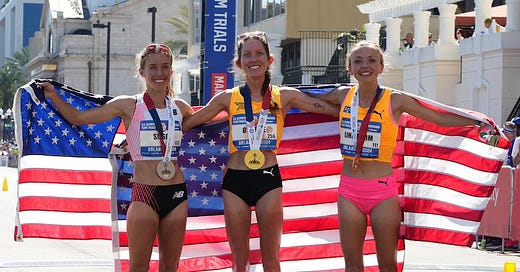

I really appreciated what you wrote last week and your rejection of Twitter. I’m a big fan!
Well-written personality feature on Tessa.